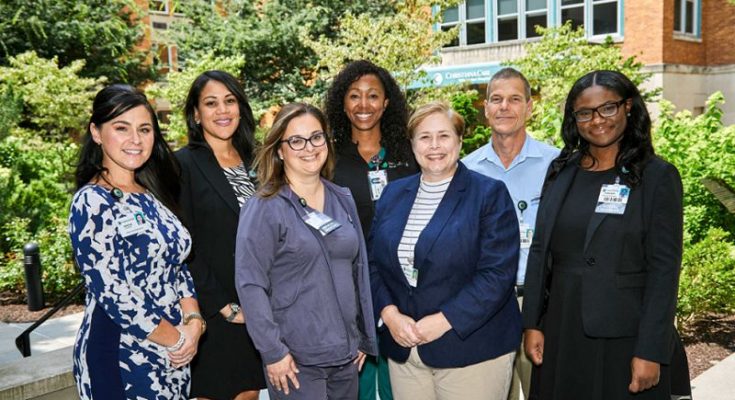When life throws its punches, the journey to healing begins with hope.
Christiana Care’s new Center for Hope and Healing at Wilmington Hospital will help some of the most vulnerable members of our community improve their medical and behavioral health while addressing social barriers that can undermine their success.
This unique, comprehensive approach to health supports patients who struggle with significant mental illness as well as a poorly controlled chronic medical condition or a significant social need, such as homelessness, hunger or addiction.
By addressing both medical and non-medical needs that can impede good health, the center’s innovative level of extended care will help patients to achieve better health and prevent unnecessary emergency department visits, hospitalizations, and readmissions.
“We understand the challenges that our patients face, and we are here to walk with them every step of the way on the road to meeting their health goals,” said Linda J. Lang, M.D., chair of the Department of Psychiatry and medical director of the Behavioral Health Service Line at Christiana Care. “We are not only healing bodies and minds with excellence; we are serving souls with love.”
The Center for Hope and Healing offers a specialized combination of:
Behavioral health to treat complex needs such as bipolar disorder, schizophrenia and severe depression.
Community interventions to address social determinants of health, such as homelessness, food insecurity and addiction.
Primary care to help patients take control of their health and appropriately manage chronic conditions such as diabetes and high blood pressure.
Initially, the center will serve about 200 patients who are identified as needing this enhanced level of coordinated care. Patients may be referred from Wilmington Hospital, including Wilmington Hospital’s adult primary care practices, and Christiana Care’s Carelink CareNow Community Team program, which already serves a wide variety of people in the community with complex medical and non-medical needs. Patients with complex needs are often high users of acute health services. This population comprises fewer than 10 percent of all patients but accounts for more than 20 percent of all hospital visits.
“This kind of coordinated care for patients with complex medical and non-medical needs benefits everyone,” Dr. Lang said. “By helping them to overcome their barriers to health and more effectively manage their behavioral health and chronic medical conditions, we help them to live the healthy lives they want to live. At the same time, we are helping them to prevent the need for emergency care or hospitalization, which means that we are potentially reducing their cost of care.”
The Center for Hope and Healing team coordinates medical, behavioral health and community resources and connects with participants regularly for an average of nine months to ensure compliance or to break down additional barriers. Once services are in place to support sustainable health and the patient demonstrates skills to access and manage medical, behavioral and social health needs, patients will partner with their primary care providers for ongoing chronic disease and behavioral health management.
“We’re going to wrap support services around these patients, stabilize them, assist them to gain control of their health and set up a long-term plan for self-management of their physical, mental and social health” said Diane Bohner, M.D., MS, FACP, clinical lead for the new center.
The program is designed to make patients feel comfortable and welcome. Team members will meet patients when and where they need them — in a clinical practice, out in the community, in their car or at their place of worship.
“These individuals need help quickly and often require intensive attention, especially early in their journey,” said Dr. Bohner. “For many, the help provided by the Center for Hope and Healing will make all the difference.”
A pilot program for the new Center for Hope and Healing earned the Delaware Health Care Commission’s first value-based payment reform mini-grant in 2018 as part of the State Innovation Model Initiative. Based on the success of the pilot, the center’s work also is expected to improve adherence to preventive practices, such as mammograms and immunizations.
Source: Christiana Care

